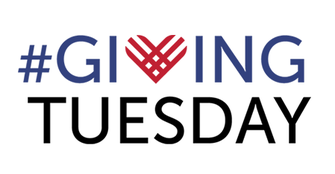
Are you considering making a donation of any size to a non-profit ministry for #GivingTuesday? We’d love it if you’d consider supporting Valley Haven Camp and Retreat Center! We are a registered 501c3 and all gifts are tax deductible. We're passionate about the restoration that we see the Gospel bringing in people's lives through this ministry. We’ve put together a TOP SEVEN LIST of reasons why your support of this ministry matters so much!
There it is folks. There are dozens of reasons to invest in Valley Haven Camp and Retreat Center. Those listed above are some of the highlights that we see regularly. Would you consider making a tax deductible gift this year to Valley Haven Camp and Retreat Center? Your investment of any amount goes a long way!
Special Note: Please note that Valley Haven still operates under the name Parson of the Hills Christian Outreach as noted on the secure giving page.
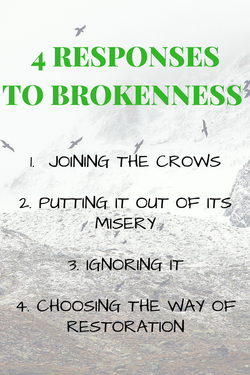 Of Woodpeckers and Brokenness We literally heard screams coming from behind the cabins. Joni and I had just finished cleaning the lodge down at the retreat center and as we walked outside, we heard the strangest screams coming from up in the woods behind the cabins. It was bone chilling. We had to find out what was going on. We walked up the hill and I cautiously ventured around the corner of the girls cabin as the screams got louder. As I approached, I saw large, black crows dive bombing something on the ground. That “something” was screaming the most painful sounds and couldn’t seem to escape. As I rushed over, the crows took flight and vanished. Looking down, I saw their victim - a large Pileated Woodpecker. It was the largest woodpecker I’d seen and had a bright red Mohawk atop its head. It also had a badly broken wing – likely broken by one of the large crows that had ambushed it. Making matters worse, it had somehow become ensnared in a thorn bush and couldn’t get loose. It had literally been a sitting target for the angry crows. Dodging its frantic attempts to peck my hands, I unwrapped the thorns from around the woodpecker’s wounded body and carried it out. Joni and I were both struck with a deep sense of sadness at what we had just witnessed. We had to do something. We got on the phone immediately and finally found “The Bird Lady,” a bird rehabilitation specialist who lived about 30 minutes away in Newton. Kudos to my wife that day who conquered her fear of birds and actually let a large Woodpecker ride in the back of her car on the way to Newton while our 2 boys asked a bazillion questions about the bird, those “mean ol’ crows,” and what was going to happen to it. For time’s sake, you’ll have to ask my wife for the full story which includes being invited into a bird sanctuary that afternoon and watching with horror as “The Bird Lady” placed Morning Doves on each of my boys heads (much to their sheer delight). We handed the Woodpecker into her expert care and then drove back home. A Lit Fuse Why share this story? After all, we aren’t even “bird people.” And yet, the memories of that morning have burned in my heart for a few weeks now and probably will for a long time. I believe this encounter has been etched on my heart because it’s a vivid picture of Jesus’ tender love for the broken. Who are the broken? Me. You. Each of us. Some of us are painfully aware of it, while others of us perform emotional gymnastics to avoid it. The human race took a knee to Satan thousands of years ago. The result is that humanity now lives in a fallen world, with a fallen nature (sin), and we have an adversary who seeks to exploit both to alienate us permanently from the affections of our Father. Our reality is one of brokenness and that brokenness can be seen in anything that exposures the fracture lines that underlie our humanity. 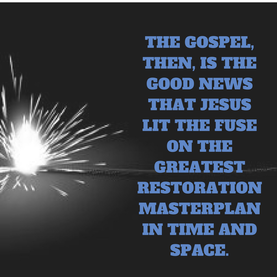 The good news, however, is that our God burns white hot with a passion for restoration. And since He IS God, after all, that’s really good news. Thus, God embraced all of our weaknesses and became a human, offered Himself up as the only perfect substitute for the same ones that rejected Him, and died in sacrificial love to redeem and restore us from that which would have otherwise destroyed us. He who was WHOLE became BROKEN for the BROKEN so that they might become WHOLE IN HIM. It was deep, gut-wrenching, mind blowing affection that led the Creator of the universe to step in and provide a means of redemption and restoration for His children. He is more passionate about restoration than we could ever dare imagine. The Gospel, then, is the good news that Jesus lit the fuse on the greatest restoration masterplan in time and space. Through a simple trust in Jesus and the sufficiency of His sacrifice for us, we are given access back into all of the Father’s affections and his approval. It is this approval (righteousness) and affection that heals our broken souls. As we journey through this life it is the sin-disarming and wound-healing love and approval of our Father that initiates this process of restoration in our lives. Our Thorns and Crows Like the woodpecker, we can become ensnared in the thorns of sin. This is the flesh. And while we (those who’ve trusted Christ and His substitutionary death for us) are new creations in Christ, the entirety of the New Testament bears witness to the fact that we still wrestle against that old sinful nature (the flesh). And we will until we come face to face with Him. Sin in our lives, at the root, is the result of us having substituted something other than the love and approval of God (which we have in Christ) with anything else. In theological terms, sin is the result of trusting anything other than Christ as our righteousness. It’s idolatry. It leads to bondage. It often puts those around us in bondage. The collateral damage of sin cannot be underestimated. One individual’s sin can impact generations, cultures, families, friendships and communities. Thus, we are surrounded by brokenness… that which has resulted from our own sin or from the sin of others who walk this earth with us. It’s an epidemic. Like the woodpecker, we too, get ambushed by the crows of this broken world and the schemes of Satan. The world and its systems are broken as well and awaiting restoration (Romans 8:18-25). In the meantime, we see that sin has actually invaded the systems of the world around us. And often these broken systems lead to personal brokenness. For example, why is the LOVE of money a root of all kinds of evil (1 Timothy 6:10)? Money offers to quench the thirst of the soul for approval and validation. But it’s never enough. It’s a craving that only grows with time. To quench that ever growing thirst, we are often willing to compromise the well-being of others. Love of money can breed workaholism, which in turn can leave a neglected child with a nagging sense of inadequacy, woundedness, and brokenness – the result of never being as important as the almighty dollar. Love of money can lead us to willingly and negligently cut corners in an effort to save time and increase financial margin. Consider the company that dumps waste into a river. The contamination of that river can lead to the sickness of an entire community… physical brokenness as the result of a world system that was corrupted by sin. These, like the crows that ambushed the unsuspecting woodpecker, leave many broken physically, emotionally and spiritually. Paul reminds us in his letter to the Ephesians that there is a dark spiritual reality directly or indirectly behind much of the pain and suffering in this world. He says that our current battle is “against the rulers, against the authorities, against the cosmic powers over this present darkness, against the spiritual forces of evil in the heavenly places.” (Ephesians 6:12). Yes, Satan has been defeated. He’s lost the battle because of the sacrificial Savior who stood in our place to give us authority over him, his tactics, and his accusations. But there’s still a war being fought that won’t end until Christ our King returns and throws Satan and the forces of darkness into a place of eternal judgment (Rev. 20:10). In the meantime we see immense brokenness around us. This broken world, it’s broken and corrupted systems and the evil behind it leave many feeling grounded and ambushed much like the woodpecker did from those “mean ol’ crows.” …But the fuse has been lit. Our Four Options Each of us finds ourselves in the situation that my wife and I did that day. The difference is that the screams and the sounds of suffering come from those around us. The earth is filled with the broken, the wounded, the bruised, the weary, and the battered. Their brokenness is the result of the thorns of sin and the viciousness of a broken world and its illegitimate prince. Those screams manifest in multiple ways: anger, depression, anxiety, loneliness, isolation, addictions and so on… How will we respond? The way I see it, we have at least 4 primary modes of response. Ignoring: I was really busy the day that woodpecker was screaming. I honestly had many things that were high on my priority list at the moment. In the same way, there are many of us who are legitimately busy and choose to ignore the cries of the broken around us. We hop in our car, crank the radio up and head on. But what if those who are wounded are actually at the top of God’s priority list? What if we heard the cries of the broken, reflected on our own journey and need for restoration at many points? What if the most exciting journey of life was joining Christ in His great restoration movement across the earth? 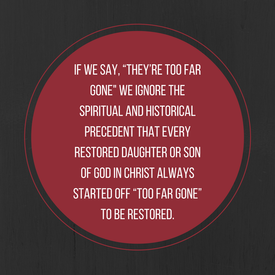 Putting It Out of Its Misery: Don’t think it didn’t cross my mind. Helping this woodpecker was going to be messy. It was going to be time consuming. And there were no guarantees. Many would probably roll their eyes and consider me foolish for wasting my time on this bird. In the same way, the threat of being judged by others for helping the weak and broken is real. We may be labeled or judged. Jesus was. There is a chilling scene in the movie The Revenant (spoiler alert ahead). A tracker named Glass (Leonardo Dicaprio) is leading a band of survivors across a barren land when he is attacked by a bear and mauled. He is fighting to survive, but he’s badly wounded. Fitzgerald (Tom Hardy) is left behind and charged with ensuring that he recovers or giving him a proper burial if he cannot. Fitzgerald, however, has no patience for this weakness. To him, caring for the weak is a sign of weakness. He also has no hope for Glass’ recovery and restoration. And so in a moment of great selfishness, he literally drags Glass into a grave and piles dirt upon him, leaving him there to die. We, like Fitzgerald, are often tempted to write off the broken. We say, “they’re too far gone.” When we do so, we ignore the spiritual and historical precedent that every restored daughter or son of God in Christ has always started off “too far gone” to be restored. And yet, in this place of great brokenness… this sacred place…the Healer and Restorer moves in incomprehensible ways to restore the broken and set them aflame with His own passions for restoration. Joining the Crows: Moment of honesty here… We’re all broken. And we hate it. Sometimes, instead of leaning into the embrace of Jesus the Restorer to heal our wounds, we’d rather dive bomb those who are more broken than we are in an attempt to make us feel better about our own woundedness. We judge. We gossip and slander. We reject. We isolate. We form cliques of more “acceptable” broken people and keep out those whose brokenness is more culturally and societally reprehensible than our own. It takes the attention off of our own wounds and brokenness. We insulate ourselves from seeing our own needs and we cast those who need the tender love and restoration of our Father further down into the pit. It’s cruel. It’s awful. And it’s a common human temptation. It’s joining the crows in their ambush of the weak and defenseless. Choosing the Way of Restoration: But there’s another option. We can join Jesus, who lit the fuse on the most powerful masterplan of restoration one could have ever imagined. In John’s Gospel, He describes Jesus’ mission this way: “The Word became flesh and made His dwelling among us. We have seen His glory, the glory of the one and only Son, who came from the Father, full of grace and truth.” Now this is deep. There’s much to say about this verse as it is building upon the book of Exodus and saying many things about the uniqueness of Jesus and His mission. For simplicity sake, I’d offer this as a paraphrase of this verse: “Jesus (Who is God) became a man… He came from upon high and got down in the ditch with us… He showed us the clearest picture of the true nature and heart of God as He walked this earth and died in our stead… He came to us full of grace and truth (the Gospel).” Why? Restoration. It was the only way to restore the Kingdom and bring His children back into His arms. Did you catch that? Jesus didn’t come with a formula so that we could follow a ten step process to restoration. He came as Restoration. He is the Restorer. He didn’t just shout answers from above the ditch. He got down in it and loved immensely and passionately. His journey through the ditch ultimately led Him to a Cross. He died with all of the brokenness and grime of our ditches upon Himself. And as He cried out “It is Finished,” His broken body became the way back to the Father. The way of Restoration was finally open to us, the broken. So how do we join Jesus in His passion for restoration? We can begin by loving the broken… entering into their situations and their ditches… and offering them the hope of restoration that is only found in the Gospel of Jesus Christ. This hope is rooted in Jesus’ death and resurrection, and has the power to unite us to the love and approval of our true Father. For His love and approval alone can restore our brokenness. 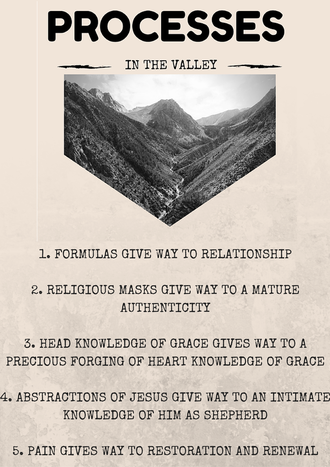 We’re surrounded by walls. As humans, we constantly erect walls because we want to keep others out. We put up cubicle walls to keep out coworkers. We put up house walls to keep out neighbors and maintain privacy. We put up metaphorical walls when we want emotional space from others. We seem to be obsessed with walls. Walls provide many functions, but one of their primary uses is to barricade us from others. Walls are generally a giant “Keep Out” sign. Our journey into the valley is full of walls as well. Jesus, the Good Shepherd, is intent on leading us beside quiet waters where He will restore our souls. But to get to those waters, He must topple many of our walls – often ones we were unaware we had put up. We talked about some of those walls in the second blog of this series – formulas and religious masks. The valley is a place where we experience pain and suffering… a place where our walls come into full view. We used to think these formulas were the keys to success. We thought these masks were what God, ourselves or others expected of us. But something is usually hidden behind these walls. Often it’s not even seen by us. We’ve hidden it because it seems too repulsive… too painful… too ugly to bring into the light. And so we hid it long ago. Perhaps it’s a fear, an anger, a deep doubt, a wound or an unwanted desire. We feel that if we were to bring it into the light, it would destroy us. The biggest thing that we’ve tucked carefully away from our affectionate Lord, however, is dependency. If we were to expose what lies behind our walls, deep in our hearts, we would be forced to recognize that it’s too big for us. We aren’t strong enough, powerful enough, faithful enough or loving enough. We’re dependent. And our walls are meant to cloak us in a disguise of power. They present the façade that we’ve got things together or have it all under control. You see, all of the formulas and religious masks are often self-salvation strategies we’ve subconsciously concocted to keep from admitting that We. Can’t. Fix. Ourselves. Even though we know deep down that there’s brokenness in our hearts. This brings us to the next process in the valley. Head Knowledge of Grace Gives Way to a Precious Forging of Heart Knowledge of Grace: The Scriptures say in many places, like 1 Peter 5:5, that “God opposes the proud, but gives grace to the humble.” And if there’s one thing the valley does, it humbles us. It melts away our proud walls. With our formulas and religious masks dissolved, we are left vulnerable, weak and dependent. We have come to the end of our strength and see that there must be one stronger, more faithful, more loving, more forgiving, more generous and patient, more powerful and wiser than we are because the weight of our brokenness is too much for us. This is Asaph’s story. We’ve followed him up to this point in our Valley blog series so let’s return to see how he experiences grace in the valley. Early on in the chapter, Asaph tells us of his proud walls and masks. He says that he has washed his hands in innocence and kept his heart pure. He’s livid when he accuses God of betraying him by not doling out rewards for his supreme moral behavior. But the valley melts away this weak formula that says if I live an obedient, good, or moral life, then God will bless my life in ways I’ve predetermined. This formula can’t withstand the heat of the valley. Next up is anger. Asaph says that he became a brute beast before God when life didn’t go the way he’d expected. He unleashed his anger on God. The tenderness of the Shepherd melted away even this because the affection of the Shepherd in the valley is no match for the anger we hold deep in our hearts. 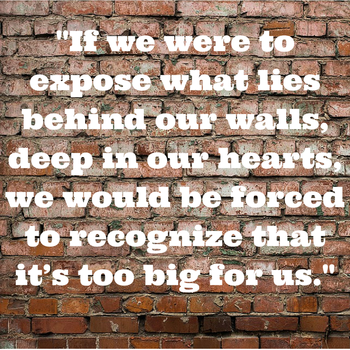 Finally, Asaph is left with no formulas. He’s unmasked and vulnerable. He’s been humbled. His walls have melted away. But the Shepherd has never left his side. When the final wall falls, it reveals a fragile heart that is desperately in need of being restored beside quiet waters. This has been the Shepherd's aim all along. Restoration. Renewal. Healing. But just what was hiding behind Asaph’s walls? What was the secret that he had stowed away subconsciously? What was so ugly… so painful… so repulsive that Asaph had tucked it away in the depths of his heart? What was this thing that he hid away for fear that it could destroy him? The answer lies in Psalm 73:26 where Asaph speaks of the grace that God revealed through his struggle: “Though my heart and flesh fail me…” Deep down Asaph knew, as we all do, that he wasn't strong enough, loving enough, pure enough, courageous enough, forgiving enough, obedient enough, faithful enough… He knew what the Scriptures cry out over and over again that there is a brokenness within us that we simply cannot heal ourselves. All of the walls, formulas and masks – they were just facades… illusions concocted to perpetuate the lie that he could be His own Savior and Healer. Ironically, these walls were the very things that were keeping Asaph from the grace he so desperately needed. And let me stop here to confront one lie. This is not simply the case when we first come to Christ for salvation. This is our condition throughout our entire journey with Christ. The Good Shepherd continually melts away our walls so that we can see that it is only be His grace that we are healed and transformed. The Shepherd led Asaph to the quiet waters to reveal his greatest fear. There by the waters, deep in the valley, Asaph could unmask the lie and admit that he needed grace. He needed One stronger than he. Later in his life, having drunk deeply of the waters of soul restoration, Asaph would reveal the grace that he found there in the valley: “Though my heart and flesh fail me, THE LORD is the strength of my heart and my portion forever.” His trust was now in the strength of the Shepherd. He was resting in grace. This brings us to the next process of the valley. Abstractions of Jesus Give Way to an Intimate Knowledge of Him as Shepherd: We don’t know whether Asaph’s situation changed. But we do know one thing, his affections were captured by the tenderness of our Lord in the Valley. At the end of the day, it’s not about how much we know about Jesus. After all, as an avid comics fan, I can tell you far more than you’d ever want to know about Captain America… but that doesn’t mean we have a deep friendship. Asaph crossed over though. He had a relationship with the Lord at the beginning of the Psalm, but it paled in comparison to the intimacy he had with Him at the end of his journey through the valley. We know this because early in the Psalm, Asaph shows us his cards. He’s after circumstantial happiness… money, happiness, health, etc. That’s his treasure. But by the end he says that THE LORD has become his reward. The Giver has captured his heart, not the gifts. And so Asaph says in verse 25, “Whom have I in heaven but you? And earth has nothing I desire besides you.” Pain Gives Way to Restoration and Renewal: At the outset of this series on Restoration in the Valley, I wrote that there is no such thing as graduation from the valley. There are no easy answers. There isn’t a formula. There are no magic band aids that make it all go away. It leaves you with a bit of a limp because you’re always aware of your dependency moving forward. You’re always aware of your tendency to stray into strategies of self-dependence. And yet, you are constantly, overwhelmingly aware of His grace… a grace that is far more powerful, healing, tender and transforming than you could have dreamt. And so, while we don’t graduate from the valley, we do look to the coming of the Great Shepherd King, Jesus Christ, who will come back to restore our souls and make us new once and for all. Grace and Rest for the journey, Nate  As we enter into a weekend of reflection upon the death and resurrection of Jesus, I want to offer some reflections on why these events are so mind numbingly beautiful. The following are 7 reasons why these events are so extraordinary. I hope you’re encouraged. 1. God sacrifices Himself: The Gospel writers go to pains all throughout their stories to point out that Jesus isn’t just a man. He’s not just a prophet. He’s God. My favorite example of this comes in John 12 as John launches into the second half of His Gospel with an incredible assertion. When the Greeks (Gentiles) begin seeking Him out as Savior, Jesus reveals that this is a sign that His time is nearing. What time? The time when he will be “lifted up.” Jesus says this frequently of Himself throughout John’s Gospel alluding to His impending sacrificial death. He says that by being lifted up, He will be “glorified.” (More on that in a moment.)John 12 is the bridge for the two halves of John’s Gospel. The first half is known as the Book of Signs (Miracles pointing to who Jesus truly is and what He came to do) and the second half is often referred to as the Book of the Passion (His Death and Resurrection). Here, in this bridging chapter, Jesus says multiple times that He must be lifted up so that He can glorify the Father. But if you don’t look closely you’ll miss the fact that Jesus quotes from the book of Isaiah twice in the context of His being lifted up and glorified. Jesus quotes Isaiah 6 and Isaiah 53. This is essential for understanding who Jesus is and what’s going to happen next. In Isaiah 53, the prophet foretells of a Suffering Servant who will sacrifice himself on behalf of God’s people to redeem them. Isaiah writes of this messianic figure, “Surely he took up our infirmities and carried our sorrows… he was pierced for our transgressions, he was crushed for our iniquities; the punishment that brought us peace was upon him and by his wounds we are healed.” It’s no secret that Jesus was speaking of Himself here. Isaiah 53 has long been realized as a depiction of the sufferings of Christ for humankind. Don’t miss how Isaiah introduces Him in the chapter 52 though. He tells us in verse 13 that the Suffering Servant will be “lifted up.” Now, in John 12, Jesus is pointing to Himself and saying, “It’s ME! Isaiah was talking about ME! I’m the Suffering Servant who will be lifted up.” By the time John’s Gospel closes we realize that being “lifted up” means lifted up on a Cross in execution. But here’s the mind blower… Isaiah 6 records a vision that Isaiah has of God in all of His glory, holiness and splendor. Isaiah paints a picture of the heavenly throne room of God. God is on His throne and it’s terrifying in its awesomeness… Angels are worshipping… doorposts are shaking… the temple is filled with smoke… And Isaiah is completely undone. It’s clear Isaiah thinks he’s about to die when suddenly an angelic being flies over to him with a coal from an altar that is in the temple. The angelic figure touches Isaiah’s lips and proclaims that his sins have been atoned for and his guilt taken away. The holiness of God in this passage had always left me in awe. But the real bombshell dropped on me in seminary as I had to translate John 12. It was only then that I saw what countless others before me had already seen… something that I had totally missed for years. Immediately following Jesus’ quotation from Isaiah’s astonishing vision of God in Isaiah 6, the Greek text literally reads, “Isaiah said this because he saw his glory and spoke about him.” Wait… Isaiah saw who? We all know he saw God. But what is John saying? What he’s saying is what makes the Gospel – the death and resurrection of Jesus so mind numbingly amazing… “Him” refers back to Jesus in verse 37. Jesus is saying, “Isaiah saw Me!!!” Here’s a quick way of looking at it: Isaiah 6: God is high and lifted up on a throne. His glory fills the temple. Sins are being blotted out. Isaiah 53: The Suffering Servant is lifted up in some form of execution. God is being glorified (although the word glory doesn’t appear). The sins of the multitudes are being atoned for. John 12: Jesus says He must be lifted up. In doing so, He will bring glory to the Father. He is then lifted up on a cross as the substitutionary sacrifice for our sins. In a nutshell, here is what John is saying: This Jesus that I’m telling you about… the one that I intimately knew… the one I touched and listened to and walked with for years... He is both the Lord of Isaiah’s vision in Chapter 6 and the Lamb of Isaiah’s prophecy in Chapter 53. God has come for His people and He is headed now to His execution in their place because of His great love for them. You may not be a follower of Jesus. You may not have tasted of His love yet or know of His tenderness and power. You may not believe the claims of Christ. But make no mistake regarding who He said He was and who His followers knew Him to be. The man who died in your place on that wooden beam... The one who was beaten and punished for our peace… The one who was crowned with thorns and spat upon, mocked and crucified is the same one who commands angels… the one they bow down to and worship as they cry out “Holy, Holy, Holy is He…” He is the same one whose presence shakes the foundations of the heavens and leaves men breathless before Him. The profound nature of Christ on the Cross is this – Your God died in your place for your redemption because of His great affection for you. 2. The Humility of God: I said we’d come back to John’s usage of the word “glorify.” John uses this word many times and it has a range of meaning in his Gospel. But at the heart of this word are the concepts of “worship” and “character” or a sense of awe and the true essence of who one is. Jesus says that when He is “lifted up,” that He will “glorify” the Father. He’s saying: “When I am crucified, you are going to see the purest reflection of my character… my heart… who I AM and it should leave you in awe.” That’s staggering because one of the primary revelations of the Cross is the humility of God. Yes… it sounds absolutely absurd, but it’s absolutely true. God is humble at heart. As Paul writes in Philippians 2, “Who being in very nature God, [Jesus] did not consider equality with God something to be grasped but made himself nothing, taking the very nature of a servant, being made in human likeness. And being found in appearance as a man, he humbled himself and because obedient to death on a cross!” (vv 6-8). That’s just mind numbing. 3. The Paradoxes: Israel wants a King to toss out the Romans and militarily take power. But Jesus shows His Kingship as the sacrificial lamb. Death becomes Life. Mourning becomes Joy. God literally shows His strength through allowing weakness. He shows His love through sacrifice. The Creator allows His creations to execute Him. But then He crushes the power of death in His resurrection. No wonder His Kingdom is an upside-down Kingdom. It’s stunning in its beauty. 4. The Centrality of the Death and Resurrection in the Great Story: After He is raised from the dead, Jesus appears to two disciples on the Emmaus Road in Acts 24. They’re crushed because Jesus was crucified. They don’t know He’s risen. They’re devastated. Enter Jesus who tells them that they’ve missed the point of the entire Old Testament. Ouch. “How foolish you are, and how slow of heart to believe all that the prophets have spoken! Did not the Christ have to suffer these things and then enter his glory? And beginning with Moses and all the Prophets, he explained to them what was said in all the Scriptures concerning himself” (vv25-26).Let’s just absorb that for a moment… Jesus tells them that the whole story up until that time was pointing towards Him and His sufferings. That’s mind numbing. Jesus is saying that approximately 4,000 years of scriptures… written by a multitude of different people… spanning 39 books… and encompassing multiple different genres from poetry to prophecy… was all pointing towards Himself. And not just Himself, but in particular they pointed to one specific event – His sufferings. The 27 books of the New Testament include hundreds of references to the Old Testament that illustrate how the writers were pointing to Jesus’ death and resurrection for the atonement of our sins (the Gospel). This event is the breathtaking catalyst that spurs the authors of the New Testament scriptures to write extensively. And for that reason, the New Testament scriptures point back at the Cross just as the Old Testament scriptures point forward to it. The events that we reflect back upon this week stand at the center of the entirety of Scripture… they stand at the center of history. 5. The Flawed Characters: I don’t know about you, but I definitely don’t have all of it together. In fact, I have very little of it “together.” I’m terribly flawed. In fact, the longer I’ve walked with Jesus, the more keenly I’ve become aware of the depths of my sinfulness as He shines the light of His Spirit into the nooks and crannies of my heart. But I’m not discouraged by this. Because I’m also aware that the depths of my flaws are no match for the depths of His forgiving and transforming grace. I mean that. His grace is that good. Take a look at the company He keeps in His final hours and note the patience, kindness and grace He shows them. There’s a criminal on the cross next to Him who asks only that Jesus save Him. And Christ pronounces that the same very day that man would join Him in paradise. There’s his best buddy Peter who has just denied him three whopping times. But after Jesus is raised from the dead, He goes straight to Peter, forgives him, encourages him and calls him to shepherd his people. And then there are the disciples. You remember them, right? The guys he spent three entire years with. And where are they? They’ve disbanded and they’re in hiding because they don’t understand that the cross was always part of the plan. These same flawed characters are forgiven, strengthened, transformed (over time no doubt) and become the leaders of the early church. His grace is astounding. And it should give flawed characters like you and I great comfort. 6. A New Creation: When Jesus explodes from the grave, He begins the renewal process of everything. Those who trust in Jesus are now united with Him not just in His death, but also in His resurrection. As Paul proclaims in 2 Corinthians 5:17, “If anyone is in Christ, he is a new creation; the old is gone, the new has come!” We aren’t just forgiven and made righteous in Christ, we’re also being transformed into His image daily. We’re being made new. Jesus is restoring and renewing all things. The world systems have begun a process of slow change because Jesus has instituted His Kingdom through the lives of His people. A Kingdom where humility, mercy, justice and love rule. A Kingdom where the true King is worshipped joyfully by those who are being renewed daily. Truly, the earth and all who inhabited it were on a collision course. But Jesus’ resurrection brings hope in an instant… the certain hope of the restoration and renewal of all things. Do you see the earth being damaged and decaying? He’s going to renew it. There is a new Heaven and new Earth coming because Jesus is releasing the earth from its state of decay. Do you grieve over suffering? Take heart. You not only have a companion who knows your sufferings intimately, but He has promised that when He returns, pain and suffering will disappear. Do you grieve to watch the poor and downtrodden oppressed? Take heart. The Kingdom of God has infiltrated the Earth through the Spirit living in God’s people. There is a new system at work now. A Kingdom where humility is prized, the poor are loved, the downtrodden are cared for, the broken are tended to and the forgotten are remembered. For this reason, our God declares, “Behold, I am making all things new” (Rev 21:5). 7. Redemption: The events that we reflect on this week are stunning because they tell us that our story is one of redemption. It’s one of restoration and renewal. It’s a story of hope. It’s a story where justice and love collide into one beautiful tapestry. And all of this is possible because of events that took place 2,000 years ago… the death and resurrection of the Creator, Our God, who came to His people and bore their punishment in death… But was raised to life that our story might be one of redemption and life. As we reflect on these events this week, may our hearts be set aflame with the great love of our humble God. Grace and Rest to you this week! -Nate 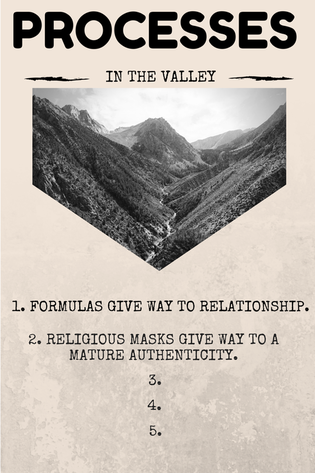 One of the most eventful parts of my night is usually between the hours of 7:30 and 8:30. That’s the time when my wife and I put our two boys down to sleep… which is about one step away from negotiating a hostage crisis. Once the boys are in bed, the fun really starts… because they don’t like the dark. Zach is notorious for suddenly developing the urge to pee out of nowhere and Jon will typically demand a fifth recital of the Itsy Bitsy Spider (or Itsy Pider!! as he likes to call it). As they finally quiet down, I hear one of the boys usually say… “Dad… It’s a little dark. I’m a little scared.” As exhausting and hilarious as it can be, my boys remind me every night that being in the dark can be uncomfortable and frightening. Eventually we all grow up and we aren’t afraid of the dark anymore. Well… sort of. The truth is, we’re still easily spooked by darkness. We may not be afraid of falling asleep in the dark. But we’re terribly frightened by other forms of darkness. In particular, we hate the darkness of the valley. In this darkness, we can’t see what’s happening. We lose our orientation. Much of life during these seasons is obscured in pitch black and we can’t see the way forward. What once seemed so crystal clear and certain becomes utterly cloaked in darkness. Often, we have absolutely no idea what God is up to. In the previous post, we talked about the most important thing that God is up to in the valley – He is with you. In this post we’re going to explore some of the processes that occur in the valley. Sometimes, we need to just camp out in the truth that He’s with us before we even try to understand the processes taking place in our heart and soul. But for those who are ready, we’re going to pull the veil back on this darkness and look at 5 processes that the Shepherd is cultivating in our hearts while in the valley. I hope you’re encouraged! One of the best passages of Scripture to understand these 5 processes is Psalm 73. The Psalm is written by Asaph who is reflecting back on a time he felt covered in the darkness of the valley. His experience provides a lot of encouragement and wisdom for us. He writes the following: 1 Surely God is good to Israel, to those who are pure in heart. 2 But as for me, my feet had almost slipped; I had nearly lost my foothold. 3 For I envied the arrogant when I saw the prosperity of the wicked. 4 They have no struggles; their bodies are healthy and strong. 5 They are free from the burdens common to man; they are not plagued by human ills. 6 Therefore pride is their necklace; they clothe themselves with violence. 7 From their callous hearts comes iniquity; the evil conceits of their minds know no limits. 8 They scoff, and speak with malice; in their arrogance they threaten oppression. 9 Their mouths lay claim to heaven, and their tongues take possession of the earth. 10 Therefore their people turn to them and drink up waters in abundance. 11 They say, "How can God know? Does the Most High have knowledge?" 12 This is what the wicked are like-- always carefree, they increase in wealth. 13 Surely in vain have I kept my heart pure; in vain have I washed my hands in innocence. 14 All day long I have been plagued; I have been punished every morning. 15 If I had said, "I will speak thus," I would have betrayed your children. 16 When I tried to understand all this, it was oppressive to me 17 till I entered the sanctuary of God; then I understood their final destiny. 18 Surely you place them on slippery ground; you cast them down to ruin. 19 How suddenly are they destroyed, completely swept away by terrors! 20 As a dream when one awakes, so when you arise, O Lord, you will despise them as fantasies. 21 When my heart was grieved and my spirit embittered, 22 I was senseless and ignorant; I was a brute beast before you. 23 Yet I am always with you; you hold me by my right hand. 24 You guide me with your counsel, and afterward you will take me into glory. 25 Whom have I in heaven but you? And earth has nothing I desire besides you. 26 My flesh and my heart may fail, but God is the strength of my heart and my portion forever. 27 Those who are far from you will perish; you destroy all who are unfaithful to you. 28 But as for me, it is good to be near God. I have made the Sovereign LORD my refuge; I will tell of all your deeds. (NIV) Process 1: Formulas Give Way to Relationship: One of the first ways that we are shaped in the valley is that our formulas are replaced by relationship. The problem with formulas is that they keep Jesus at an arm’s length. They’re an attempt to live “in control” and “pain free,” but they come at the high cost of blinding us to the love and grace we so desperately need to experience each day. They turn a life giving relationship with Jesus into robotics, or worse, religion. We subconsciously attempt to control God… to keep Him in our little man-made boxes to avoid being hurt in this life. But these boxes of our own making often imprison us. And so it is with Asaph. He’s hurting. He says he feels plagued and punished. There is real pain in this man’s life. The pain, he says, is intensified by the fact that he has done his best to obey God. It’s here that we begin to see the formula deep down in his heart begin to bubble up. It seems righteous on the surface, but it’s not so righteous the more you drill down. In his anger, Asaph reveals what he actually believes about God in the depths of his heart. The formula looks something like this: A = B OR “If I live an obedient, good, or moral life,” then “God will bless my life in ways I’ve predetermined.” But Asaph’s situation doesn’t line up. The math doesn’t work. He’s kept his heart pure. He’s washed in hands in innocence. But he’s been plagued. He feels punished. Asaph likely thinks that there are only two conclusions from this:
But there’s a third option. And Jesus is often waiting for us by the quiet waters of restoration to reveal it:
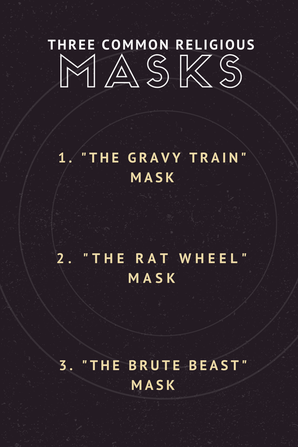 Process 2: Religious Masks Give Way to Mature Authenticity Asaph has walked out Option 1 and tried hard to please God through stricter obedience. In verses 16, 21 and 22 Asaph speaks of digging his heels in and taking Option 2. He got ticked off at God because he felt God did him wrong. He describes this place as “oppressive,” and his heart as “embittered” towards God. Apparently, he didn’t hold back either. He told God just how hurt and angry he was and describes himself as being like a “brute beast” during this season of life. Beneath his anger, there is a process taking place though. Asaph’s religious masks are melting away and being replaced by authenticity. Quite frankly, this is often a messy and ugly process. But it’s necessary. Over time, Asaph’s formulas had hardened into religious masks for him to hide behind. Often these masks look like one of the following:
What a kind, good and loving Shepherd we have that he would wade into the valley with us. This process is no picnic. The darkness and pain of the valley have a way of melting down our masks. Here, the Shepherd begins to cultivate a mature authenticity within us. Prior to this experience, we are too prideful, busy, religious, afraid or angry with God to be honest with Him. As a result, it’s difficult for grace to penetrate past our masks to heal our wounded hearts. But as the masks come down, authenticity grows… as does humility. And where there is humble, authentic acknowledgment of our pain, brokenness and neediness – you can be sure that there is fertile soil for the grace of the Shepherd to take root and begin a work of restoration. Final Thoughts: Take a look at the end of Asaph’s inspired reflection (verses 23 -28). We see a man who has been with Jesus – the Shepherd of the Valley. He has journeyed through what was undoubtedly a very messy process. His formulas have given way to relationship. His religious masks have given way to a mature authenticity. He has drunk deeply from the Shepherd’s cupped hands at the still waters of restoration and now writes: 23Yet I am always with you; you hold me by my right hand. 24 You guide me with your counsel, and afterward you will take me into glory. 25Whom have I in heaven but you? And earth has nothing I desire besides you. The illustration I used at the beginning about my boys has spiritual parallels that I think can be encouraging if you find yourself or someone you love in the valley today. The darkness can be scary, but the Father is with you there. Even when you can’t see Him, He has you by the hand. What was once clear may be obscured in darkness now, but your Father is at work even in the dark. Morning is on the other side of rest. The darkness eventually forces us to rest in our Father’s gracious embrace. On the other side of this rest is the light. Hang in there today and be encouraged. You have a Shepherd of the Valley who loves you and I more than we could ever imagine. Next Up: The Final 3 Processes and God in the Valley Let’s talk! Often transformation and growth happens in community. I encourage you to post your thoughts, reactions, or questions in the comments section of the blog below. Let’s encourage one another in the journey! 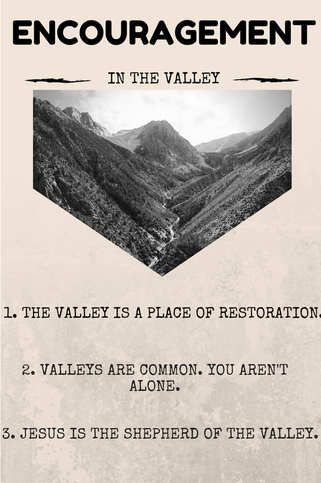 We all get stuck some times. And being human, we’re hardwired to hate the experience of being stuck. A few months ago, our little family of four was making the long trek home after visiting some friends. As we were saddling up to depart, our friends told us about a new route home. The word on the street was that it could save us up to 15 minutes. Now… that may not sound like much, but if you have small children along for the ride, every minute is precious my friend. Eager to shorten our trip, we set off. Things were going along smoothly until suddenly, it happened. The dreaded stand still traffic. Like captains at sea headed into an unavoidable hurricane, my wife and I began encouraging our little sailors in the back. “Everything’s going to be just fine boys.” But minutes turned into hours. This was that special breed of stand still traffic that truly lives up to the name. The kind where you literally – Don’t. Move. An. Inch. I pulled up an app on my phone in desperation hoping that the road would clear just ahead. Or perhaps, there was an alternate route? No dice. The traffic jam was miles and miles long and there was no alternate route. The calmness eventually spiraled into non-stop wailing from the back seat and constant requests for potty stops. But alas, there was no potty in sight. It wasn’t supposed to turn out this way, my wife and I thought. It was supposed to be a comfortable trip home. But as the minutes turned in to hours, my wife and I began to embrace reality. We… were stuck. The good news is that a few hours later we emerged and made it home safely. The bad news is that I no longer have hearing in my left ear and my hair line receded a significant amount that day. Life is a lot like that car ride for many of us. We’re all strapped in for a smooth ride. And then something happens. Except, unlike our traffic jam, it’s much more stressful, painful, angering and frightening. We think to ourselves, “It’s not supposed to be like this!” Or even worse, we fear that we took a wrong turn and that God has left us stuck endlessly in a place of pain. We wait for the cars to clear in our traffic jam of the heart, but alas, there seems to be no end in sight. Chaos often ensues in the form of depression, anger, anxiety, desperation, bitterness, and loneliness… just to name a few. There are many words in the Bible for this common human experience. But perhaps the most descriptive is the Valley. King David records the following words in what is likely the most famous of all 150 Psalms. The fact that the Valley is the subject of the most famous of all of the Psalms is certainly not an accident. The popularity of the 23rd Psalm is a testimony to how common valleys are in the human experience. If anyone would have had cause to assume that life would move along smoothly, surely it was the anointed king of God’s chosen people. Surely, the road was relatively smooth for him, right? Maybe the occasional hiccup, but he certainly never experienced the darkness and pain of the valley… right? His words tell a different story than we might assume though. Apparently, he was quite familiar with the valley. He writes the following in Psalm 23:1-4: The Lord is my shepherd; I shall not want. He makes me lie down in green pastures. He leads me beside still waters. He restores my soul. He leads me in paths of righteousness for his name's sake. Even though I walk through the valley of the shadow of death, I will fear no evil, for you are with me… Over the next few posts, we’re going to journey through the valley together… this traffic jam of the heart. So let me pause here to acknowledge the difficulty of discussing such a tough topic. In particular, I want to acknowledge that many of you who have read this far are in the valley at this very moment. The valley takes many different forms. For some it may be a traffic jam of the heart. But for others, the roadways of your heart have been literally shattered into pieces before your very eyes. My passion for journeying with others through this difficult topography arose out of my own experiences in the valley. I am intimately acquainted with its pain and darkness. I don’t think you ever graduate from the valley. The still waters of the valley are ones that I need Him to guide me to again and again. I have found that while there are no formulas here, no quick fixes or band aids, and no certainly no diplomas… Jesus does begin a lifelong journey of restoration and renewal here that will one day reach its climax we see Him face to face and every imperfection is swallowed up by His perfection. With that said… I want to close out this first post with a few observations and encouragements.
Grace and Rest for the journey, Nate |
Nate HorneI'm married to an incredible woman, Joni. We have two little treasures, Zach (4) and Jon (2). We moved out to Valley Haven Camp and Retreat Center in Hickory, NC in April of 2015 and are excited to see Jesus cultivate a relational context for restoration and renewal in His Gospel and grace out here under these beautiful mountains. Archives
November 2016
Categories |
Proudly powered by Weebly


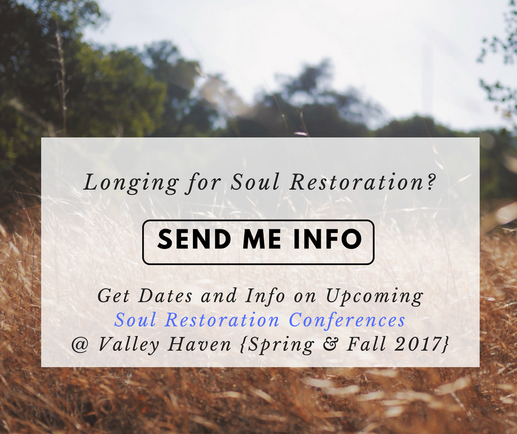
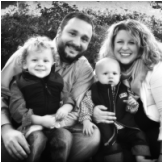
 RSS Feed
RSS Feed